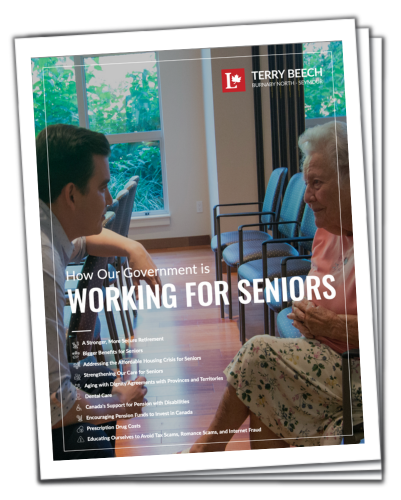Working for Seniors
How our Government is Working for Seniors
After a lifetime of hard work, seniors deserve a future to which they can look forward. That is why our government has worked hard on the issues that matter most to seniors: taking action on pharmacare, income security, and affordable housing.
Seniors continue to be one of the fastest growing populations in Canada. This is good news. It means that Canadians are living longer and healthier lives. It also means we need to be prepared for the future.
Read more about how our government has worked hard for seniors over the past four years.
Making OAS, GIS
and CPP More Robust

Around the time of the last election, one thing we were consistently hearing from seniors, as well as organizations like the Canadian Association for Retired Persons (CARP), was that eligibility to receive Old Age Security (OAS) and Guaranteed Income Supplement (GIS) should be restored back to age 65. Moving the age of eligibility back to 65, after the previous government’s decision to raise it to 67, has put thousands of dollars back in the pockets of Canadians. We also made significant increases to GIS for the lowest income seniors.
Finally, under our government, we reached an agreement to improve the Canada Pension Plan for the first time in over 20 years.
More of our work to enhance GIS, OAS, and CPP:
- Started targeted outreach to seniors, raising the uptake of Old Age Security (OAS) and Guaranteed Income Supplement (GIS). This will ensure more Canadians receive the benefits to which they are entitled.
- Increased the Guaranteed Income Supplement top-up by up to $947, helping 900,000 low-income single seniors gain greater financial security.
- Expanded auto-enrollment to include Guaranteed Income Supplement (GIS) benefits, ensuring more Canadians automatically receive the benefits they deserve.
Making Prescriptions
More Affordable

We’ve taken an approach to lower prescription drug costs nationwide by joining with the provinces and territories as a member of the pan-Canadian Pharmaceutical Alliance (pCPA). Our pCPA membership has increased public drug buying power, and given us a better position to negotiate lower prices. We are also, as part of an $11.5 billion, 10-year investment in home care, pharmaceuticals, and mental health, setting aside $544 million over 5 years for targeted support initiatives to lower the cost of prescription drugs and increase healthcare innovation.
As a long-term solution, we are on a path towards a National Pharmacare program, which will give all Canadians access to prescription drugs in the same way we have universal access to healthcare. In Budget 2018, we announced the creation of an Advisory Council on the Implementation of National Pharmacare with a mandate to study, evaluate, and provide recommendations on a path forward for a Pharmacare system that puts the needs of Canadians first. In Budget 2019, we outlined the next steps towards a National Pharmacare program and announced the creation of a Canadian Drug Agency. This agency will make medications more affordable by negotiating better drug prices. No one should have to choose between paying for prescriptions and putting food on the table. Our government understands this, and we are taking steps to make Pharmacare a reality.
We need your help so we can continue supporting our seniors.
If you agree with the steps we’re taking to focus on ensuring that when it comes time for Canadians to retire, they have the resources and supports they need, you can show your support by volunteering on our campaign, putting a sign on your lawn during the election, or making a donation.
There are always fun and engaging ways to get involved. Join the hundreds of other friends and neighbours in our community who have come together to take part in positive politics.
Your donations ensure we have the resources we need to be successful in the next election. Your support allows us to invest in new campaign tools, host townhalls, empower volunteers, and better engage our community. Thank you for your generosity!
Show your support for Team Terry and Positive Politics in Burnaby North – Seymour. Take a lawn sign, a sign for your apartment window, or a sign for your business in the next election.
Affordable Housing for Seniors
- Improving low-income Canadians’ access to affordable housing with a new National Housing Strategy, which will remove 530,000 Canadians from housing need and create 100,000 new housing units.
- Helped over 6,247 families get more affordable housing adapted to the needs of seniors through a $200 million investment in Budget 2016.
-
Estimated average of $2,500 per month for recipient households under the Canada Housing Benefit.
-
12,000 affordable units specifically for seniors, and 60,000 affordable units overall (can include seniors), under the National Housing Co-Investment Fund.
-
New, minimum accessibility standards under the historic National Housing Strategy.
Investing in Home Care, Mental Health Care, and Palliative Care
- Supporting better home care and mental health care with $11 billion in new targeted funding over the next 10 years.
- Supporting caregivers with the new Caregiver Credit and Employment Insurance caregiver benefit, which gives eligible caregivers up to 15 weeks off work to care for a critically ill or injured family member.
- This may also be combined with the Compassionate Care Benefits, which allows up to 26 weeks of benefits.
- Investing $20 million in community-based projects that support Canadians living with dementia and their families.

